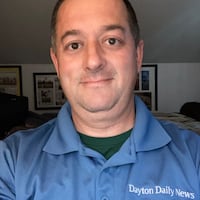A Carlisle, Ohio, native, Hamlin graduated from Ohio Wesleyan University in 1951. He began his broadcasting career in 1953 in Lima and later worked in Birmingham, Ala., covering Auburn sports.
Hamlin started working at WHIO in 1960 and served as sports director for radio and television until 1977. He broadcast UD football and basketball games, including the 1967 NCAA championship game between Dayton and UCLA and Dayton’s NIT championship victories in 1962 and 1968. In his career, he also covered sports at Ohio State, Wright State and Central State.
Dayton advanced to the NIT Final Four in 1961, Hamlin’s first season as the radio and TV voice of the Flyers. Back then his voice was carried on the radio and TV broadcasts at the same time. He grew up listening to boxing matches broadcast from Madison Square Garden and ended up calling games from the famous arena that season.
“I had to pinch myself,” Hamlin said in 2012.
Hamlin moved to WKEF in 1977 and worked there until 1985. He was named Ohio Sportscaster of the Year six times. He was Dayton’s Jaycees’ Citizen of the Year in 1968. He was inducted into the Dayton Area Broadcasters Hall of Fame in 2005. His biography at the time estimated he had covered more than 1,500 college and high school football and basketball games and logged more than 20,000 sportscasts on Channels 7 or 22.
“He was a really good guy,” Bockhorn said. “Up until six or seven months ago, he would call the house a lot and say what a great job you guys are doing. He was very complimentary.”
Hamlin was preceded in death by his wife of 59 years, Phyllis. They met at Ohio Wesleyan. He is survived by his son Chuck Hamlin, a news videographer at WHIO, and his daughter, Margo Hutchison, of Minneapolis.
Chuck Hamlin said his dad’s health declined in recent years but he remained mentally sharp. He remembers helping his dad broadcast games from the UD Fieldhouse and, of course, watching his dad on TV every night.
“Growing up, I kind of thought every dad was on TV until I was at someone else’s home,” Chuck said. “It’s something you grow up and are kind of accustomed to. … Anybody that knew my father knew sports was his life.”
About the Author
